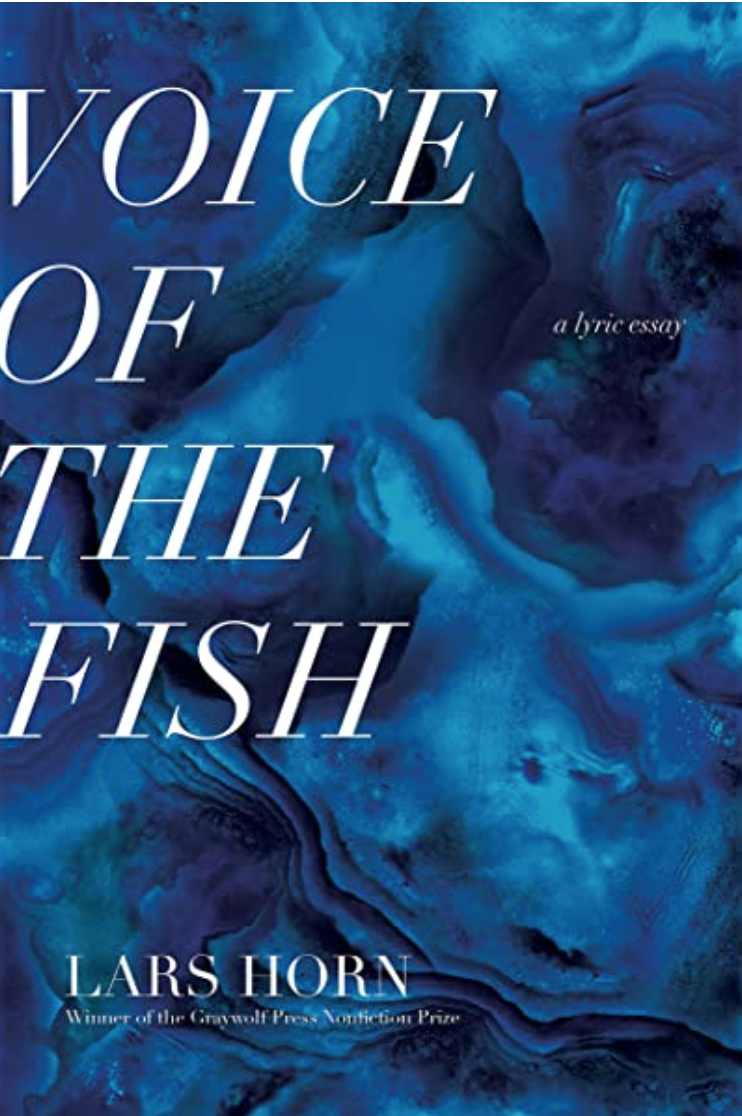AUTHOR LARS HORN writes in Voice of the Fish: “Past a certain age, my own reflection became increasingly difficult to look at. So, I didn’t. I looked out. Around. At others. Animals. Trees. Anything not myself.” Looking outside themself—the author uses they/them pronouns—is one of the primary ways in which Horn makes this lyric essay, as the book is aptly subtitled, a superb achievement.
Along with autobiographical memories, Horn offers signposts in the form of stories, references, and quotations from a wide range of sources. What they have to do with Horn’s life isn’t obvious at first. In time, they form the structure upon which the author builds and shapes their discoveries about who they are, or at least who they may be at any given time. This book-length essay consists of observation and epigraph as intimate history. The interpolations create breaks and rhythmic shifts that serve as intellectual context for the personal narrative. They divert our gaze away from Horn toward poetry, history, theology, myth, and science, always bringing the reader back to the author’s thorny experience of self.
Horn, who identifies as queer and transmasculine, was raised by a woman who was a conceptual artist first and a mother second. Frequently mistaken for a man, their mother
Functioning as an artist’s tool or an object, Horn’s body was regularly incorporated into their mother’s installations. Among other things, she used Horn as a model for full-body casts, and there was a memorable occasion when she photographed Horn holding their breath, eyes open, in a bathtub full of dead squid. A fascination with acts of creation is just one of many threads that Horn weaves through their meditations about the body as a liminal object, a thing outside oneself to be assessed, decorated, disguised, encountered, and accounted for.

Their natural inclination to gravitate to everything male—“As a child, I screamed if anything female touched my skin. I attended boys’ youth groups, played on boys’ sports teams”—was stifled after puberty. “I knew myself better at six, at eight, at ten, than I did at eighteen, twenty-three. Only in my late twenties did I return to a self I had asphyxiated for over a decade. When you’ve … actively encouraged something within you to die, suffocate … it takes time to resuscitate a self, a life you’ve endeavored to forget.”
The process of reclamation began after Horn attended universities in Edinburgh, Montreal, and Paris, and then traveled and worked in Russia, Georgia, and Ukraine. Strangers experienced Horn in ways that ranged from indifferent or knowing to disconcerting and dangerous, all of which further informed their self-understanding: “A child pointing at me as I shower: ‘What is it?’ The mother: ‘It’s a woman, there are lady parts.’ At a new job: ‘Is it a man or a woman?’”
In 2014, Horn tore a muscle in their shoulder while weight-lifting, which led to a complete and mysterious physical shutdown. At the nadir of the illness, Horn, bedridden, could not speak or read for six months. The vast web of associations gathered by the author underpins their attempt to understand the journey from invalid to a new normal.
Most of the myths and scientific information relate in some way to fish and water. The sources range from ancient Egypt, Greece, China, and Japan to Catholic saints, literature, history, and scientific discoveries. In many a fish tale, whether conveyed in anecdote, aphorism, or prose poem, it is the water that dictates how a fish is understood, valued, used, or mythologized. Horn revels in the mystery of life by embracing its ambiguity and complexity. The contradictions and contrasts in this essay are what prevent it from being a polemic or an inspirational memoir. Few dots are connected or conclusions drawn. Horn is an amiable and generous guide who doesn’t make ideological demands on the reader. Sometimes a fish is just a fish.
The strength of Horn’s structure is apparent in their recounting, over the course of twenty pages, a thwarted but devastating physical assault they experienced on a pre-dawn London street. Horn begins with legends of St. Lucy and her iconography as patron saint of sight, blindness, light, and dark, whose dismembered eyes witness acts of evil. Then, intertwining brief descriptions of the attack, there are short prose poems, news of the most recent chemical experiments to create pure black and complete darkness, quotations from the books of Genesis and Revelation, and others from Ovid, Derek Jarman, and Heinrich Zimmerman. None of these are digressions; they are building blocks that support Horn’s style, looking outward in order to let the reader know what they feel.
Another chapter is a selective history of tattoos, sources of ink, early parchment, and the use of punitive tattooing in cultures ranging from Polynesia and the Maori to Japan, England, India, Scythia, Siberia, Khakassia, and ancient Greece and Rome. The accumulation of this information sparks the emotional charge in Horn’s experience of being tattooed and their subsequent questions about language, the body, and the illusion of permanence.
Certain chapters—collections of facts, images, and anecdotes—can feel like scrapbooks of Horn’s intellectual passions, their most precious items revealed in impeccable, direct prose. To read this book is to share in Horn’s solace, to visit their world, where the past becomes prophesy. One learns to trust the author’s curiosity, and to admire their ability to curate this investigation into a compelling life in progress.
Thomas Keith is the author of Robert Burns’s Life on the Stage (2022).






